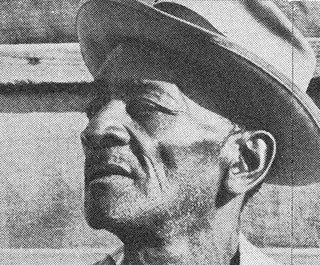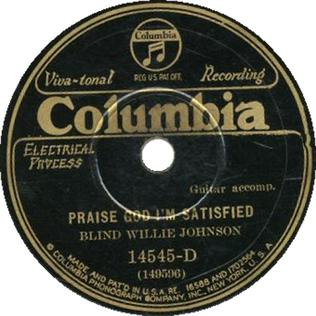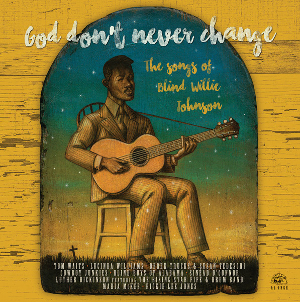
Beau De Glen "Mance" Lipscomb was an American blues singer, guitarist and songster.

Blind Willie Johnson was an American gospel blues singer and guitarist. His landmark recordings completed between 1927 and 1930—thirty songs in total—display a combination of powerful "chest voice" singing, slide guitar skills, and originality that has influenced generations of musicians. Even though Johnson's records sold well, as a street performer and preacher, he had little wealth in his lifetime. His life was poorly documented, but over time, music historians such as Samuel Charters have uncovered more about Johnson and his five recording sessions.

Gary D. Davis, known as Reverend Gary Davis and Blind Gary Davis, was a blues and gospel singer who was also proficient on the banjo, guitar and harmonica. Born in Laurens, South Carolina and blind since infancy, Davis first performed professionally in the Piedmont blues scene of Durham, North Carolina in the 1930s, then converted to Christianity and became a minister. After moving to New York in the 1940s, Davis experienced a career rebirth as part of the American folk music revival that peaked during the 1960s. Davis' most notable recordings include "Samson and Delilah" and "Death Don't Have No Mercy".

Stefan Grossman is an American acoustic fingerstyle guitarist and singer, music producer and educator, and co-founder of Kicking Mule records. He is known for his instructional videos and Vestapol line of videos and DVDs.

Charlie Parr is an American country blues musician. Born in Austin, Minnesota, he spent part of his childhood in Hollandale before starting his music career in Duluth. His influences include Charlie Patton, Bukka White, Reverend Gary Davis, Dave Van Ronk, Mississippi John Hurt, and his self-professed "hero" "Spider" John Koerner. He plays a Mule resonator, National resonator guitar, a fretless open-back banjo, and a twelve-string guitar, often in the Piedmont blues style. He is divorced from Emily Parr, who occasionally adds vocals to his music. He has two children.
Nick Katzman is an American blues musician. Katzman was born in New York City, and lives in both Manhattan and Berlin, Germany. He plays in a variety of musical genres, including Chicago blues, Mississippi blues, Texas blues, and ragtime.
Gospel blues is a form of blues-based gospel music that has been around since the inception of blues music. It combines evangelistic lyrics with blues instrumentation, often blues guitar accompaniment.

No Dirty Names is a 1966 album by artist Dave Van Ronk. It features the first recorded version of Bob Dylan's song "The Old Man".

Ernie Hawkins is an American acoustic blues guitar player, singer, songwriter, recording artist, and educator.

"It's Nobody's Fault but Mine" or "Nobody's Fault but Mine" is a song first recorded by gospel blues artist Blind Willie Johnson in 1927. It is a solo performance with Johnson singing and playing slide guitar. The song has been interpreted and recorded by numerous musicians in a variety of styles, including Led Zeppelin on their 1976 album Presence.

The Soul of a Man is an album of "twenty haunting spiritual blues songs" recorded in the late 1920s and 1930 by the American gospel blues singer and guitarist Blind Willie Johnson that was released by Charly Records in 2003.
"Keep Your Lamp(s) Trimmed and Burning" is a traditional gospel blues song. It alludes to the Parable of the Wise and Foolish Virgins, found in the Gospel of Matthew at 25:1-13, and also to a verse in the Gospel of Luke, at 12:35.

"Let Your Light Shine on Me" is a traditional gospel blues song, having been recorded by The Wiseman Quartet in 1923, by Ernest Phipps in 1928, and by Blind Willie Johnson in 1929. The song itself is also known as "Shine On Me", "Let It Shine on Me", "Light from the Lighthouse" and "Light from Your Lighthouse".

"God Don't Never Change" is a gospel blues song recorded by Blind Willie Johnson in 1929. The song is sometimes titled "God Don't Ever Change".
"Trouble Will Soon Be Over" is a traditional gospel blues song recorded in 1929 by Blind Willie Johnson and Willis B. Harris, who is thought to have been his first wife.

"Praise God I'm Satisfied" is a traditional gospel blues song recorded in 1929 by Blind Willie Johnson and Willis B. Harris (vocals), who is thought to have been his first wife.

God Don't Never Change: The Songs of Blind Willie Johnson earned Grammy Award nominations for Best Roots Gospel Album and Best American Roots Performance for Blind Boys of Alabama recording of Mother's Children Have a Hard Time. The compilation was produced by Jeffrey Gaskill of Burning Rose Productions. The package features extensive historical liner notes by author Michael Corcoran.

The Complete Blind Willie Johnson is a compilation album of all the known recordings by American gospel blues singer-guitarist Blind Willie Johnson. As part of the Roots N' Blues series, it was released jointly by Columbia Records and Legacy Recordings, on April 27, 1993. All of the tracks on the two-compact disc set were originally issued by Columbia on the then-standard two-sided 78 rpm record format.

American Epic: The Best of Blind Willie Johnson is a compilation album released to accompany the award-winning American Epic documentary film series. It collects performances from Blind Willie Johnson's five recording sessions for Columbia Records in Dallas, Atlanta, and New Orleans between 1927 and 1930. The album was released as a 16-track download and a vinyl LP.















